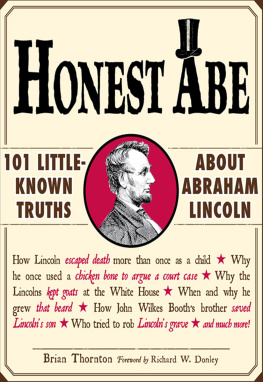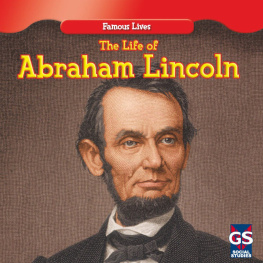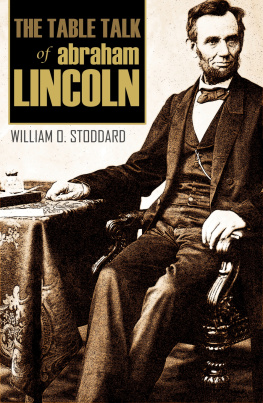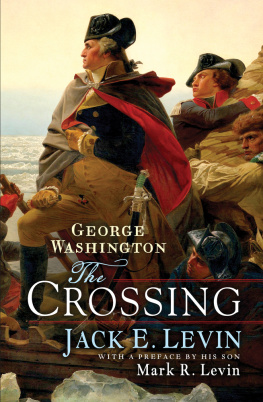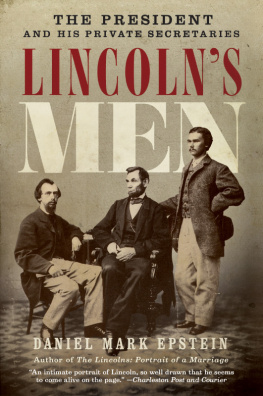John Pharr - Damnd on Earth: Was Abraham Lincolns Martyrdom a Form of Suicide?
Here you can read online John Pharr - Damnd on Earth: Was Abraham Lincolns Martyrdom a Form of Suicide? full text of the book (entire story) in english for free. Download pdf and epub, get meaning, cover and reviews about this ebook. year: 2020, publisher: Bowker, genre: Non-fiction. Description of the work, (preface) as well as reviews are available. Best literature library LitArk.com created for fans of good reading and offers a wide selection of genres:
Romance novel
Science fiction
Adventure
Detective
Science
History
Home and family
Prose
Art
Politics
Computer
Non-fiction
Religion
Business
Children
Humor
Choose a favorite category and find really read worthwhile books. Enjoy immersion in the world of imagination, feel the emotions of the characters or learn something new for yourself, make an fascinating discovery.

- Book:Damnd on Earth: Was Abraham Lincolns Martyrdom a Form of Suicide?
- Author:
- Publisher:Bowker
- Genre:
- Year:2020
- Rating:4 / 5
- Favourites:Add to favourites
- Your mark:
- 80
- 1
- 2
- 3
- 4
- 5
Damnd on Earth: Was Abraham Lincolns Martyrdom a Form of Suicide?: summary, description and annotation
We offer to read an annotation, description, summary or preface (depends on what the author of the book "Damnd on Earth: Was Abraham Lincolns Martyrdom a Form of Suicide?" wrote himself). If you haven't found the necessary information about the book — write in the comments, we will try to find it.
John Pharr: author's other books
Who wrote Damnd on Earth: Was Abraham Lincolns Martyrdom a Form of Suicide?? Find out the surname, the name of the author of the book and a list of all author's works by series.
Damnd on Earth: Was Abraham Lincolns Martyrdom a Form of Suicide? — read online for free the complete book (whole text) full work
Below is the text of the book, divided by pages. System saving the place of the last page read, allows you to conveniently read the book "Damnd on Earth: Was Abraham Lincolns Martyrdom a Form of Suicide?" online for free, without having to search again every time where you left off. Put a bookmark, and you can go to the page where you finished reading at any time.
Font size:
Interval:
Bookmark:
Damnd on Earth
Was Abraham Lincolns Martyrdom a Form of Suicide?
John C. Pharr
2015 John C. Pharr
Cover design by ebooklaunch.com

This was a ribbon handed out at veterans reunion, probably the Union Light Guard of Ohio. Reunions were very popular in the late 19 th and early 20 th centuries and badges or ribbons were usually available. Photograph found by the author at the Lincoln Library, Springfield, Ill in 2011.
TABLE OF CONTENTS
I congratulate you and the Nation on the glorious news in your telegram just recd. Allow me respectfully to ask you to consider whether you ought to expose the Nation to the consequence of any disaster to yourself in the pursuit of a treacherous and dangerous Enemy like the rebel army. If it was a question concerning yourself al only I should not presume to say a word Commanding generals are in the line of their duty in running such risks. But is the political head of a nation in the same condition. Secretary of War Edwin M. Stanton to President Abraham Lincoln at City Point, Virginia, 10:20 a.m., April 3, 1865.

Exactly as Stanton predicted, twelve days later disaster indeed came to the political head of the fledgling United States. Lincolns assassination was the culmination of an amateurish operation headed by a heavy-drinking, narcissistic southern sympathizer and his little band of misfits and losers. Assassination was utterly predictable and had in fact been predicted ever since Lincoln was nominated. Among those who predicted Lincolns violent end was Lincoln himself. As soon as he was elected he came to believe that he would die violently at the end of his tenure as president, and lived with that belief throughout his administration. The wonder was not that he was assassinated but that he lasted as long as he did.
The timing of the assassination could hardly have been more propitious for instant martyrdom. Lincoln died Christ-like, murdered on Good Friday, for the nations sin of slavery. This comparison was made immediately by Northern ministers and journalists, who also compared Lincoln to Moses, leading his people to the promised land, glimpsing but not getting there himself. As one minister said a few days after the assassination, Godcaused him to go up like Moses, into the mountain at Richmond, and look over upon the promised land which it was not permitted him to enter.
Through the ensuing decades of Lincolns apotheosis from flawed human to secular saint, responsibility for his vulnerability to assassination was never visited upon Lincoln himself. On the contrary, Lincolns cavalier disregard of personal safety throughout his administration has historically been regarded as an endearing trait. In addition obviously to John Wilkes Booth, blame has been assigned to Lincolns would-be bodyguards, and even Secretary of War Edwin Stanton in a bizarre conspiracy theory. But never Lincoln himself.
For the five years starting with his nomination and election, the pressure on Lincoln from his personal life, marriage, politics, and the war, was more stupendous than most people realize. Many could not have functioned at all in this meat-grinder, much less performed as gracefully and remarkably as he did. This nation is unbelievably lucky Abraham Lincoln was on the scene at that critical point in time and owes him a tremendous debt of gratitude.
But was something amiss? Mary Lincoln was mentally unstable, and had already lost two young sons. One died a prolonged and painful death only three years before an assassin blew her husbands brains out as she sat quietly next to him. Neither of their other two sons, Robert and little Tad, deserved to be fatherless. The nation did not deserve to have its successful war president replaced by a vice president who was drunk when sworn in, a harbinger of how spectacularly ill-suited he was for the delicate political task of Reconstruction.
And there were impacts that were more direct. Major Henry Rathbone and his fianc Clara Harris accompanied the Lincolns to the play. General Grant and his wife Julia were originally scheduled to attend, but Julia did not care for Mary Lincoln and they left that night on a train to New York to visit their son. Secretary of War Edwin Stanton refused to permit one of his assistants to go because, in a great irony, he was trying to discourage Lincoln from risking his life. The Lincolns had to approach a long list of potential companions before Major Rathbone and Clara were found to be available.
Sitting on a couch about 15 away from and slightly behind Lincoln, Rathbone did not detect Booth as he stealthily entered the presidential box. (Or maybe he did in Rathbones initial statement to investigators, later changed, he said he noticed Booth, but of course did not think he would shoot the president.) Nor was he able to apprehend the assassin despite receiving a deep knife wound in the arm. In subsequent years the pain and guilt of these failures ate away at Rathbone, slowly driving him insane. On December 22, 1883, in Hanover, Germany, he knifed Clara to death with their children in the house. He spent his remaining 28 years in an insane asylum.
In addition, upon Lees surrender, after four years of carnage, indescribable joy and relief swept the North. The Washington Evening Star on April 14 described the Capitol City: The very heavens seemed to have come down, and the stars twinkled in sort of a faded way, as if the solar system was out of order, and earth had become the illuminary. Everybody illuminatedEvery flag was flung outgorgeous lanterns danced on their ropes along the walls in a fantastic way, as if the fairies were holding holiday inside. That very day, the American flag had been raised in a ceremony at Ft. Sumter.
At 10:20 p.m. that night, the audience at Fords Theater heard a pistol report and saw smoke from the Presidents box. It seemed to be part of the play until Mary Lincolns otherworldly screams pierced the air. Suddenly the nations joy and relief gave way to shock, grief, mourning, and uncertainty. Harpers Weekly reported, Exultation that had known no bounds was exchanged for boundless grief.
Lincoln knew adverse consequences would follow his death in office. It was, after all, not just his death, but the death of the leader of a nation. But he resolutely remained reckless with his life, the evidence of which is irrefutable.
Stanton was among a growing chorus of people who warned Lincoln that he was in mortal danger, and that the country needed him to stay alive. His April 3, 1865 telegram was only one of innumerable examples, which includedplease dont go to the theater unprotected.
Lincolns response to Secretary Stantons frantic April 3, 1865 telegram quoted above was a brief and languid, Yours received. Thanks for your cautionI will take care of myself.

Lincoln suffered from depression, a form of mental illness that varies widely in its intensity and duration. He learned to cope with it so successfully that based on his performance, prominent historians have concluded that he did not suffer from it at all. No one suffering from depression could have accomplished all that, the thinking goes. But there is no doubt that he did suffer from this most pernicious and difficult to diagnose, cope with and treat illness.
The following pages tell a story of astonishing resilience from living with a potentially disabling condition and the limits on resilience. Why would a man so profoundly capable, and who rendered such an incomparable service to his country, and to history, essentially gave himself up to be murdered?
Next pageFont size:
Interval:
Bookmark:
Similar books «Damnd on Earth: Was Abraham Lincolns Martyrdom a Form of Suicide?»
Look at similar books to Damnd on Earth: Was Abraham Lincolns Martyrdom a Form of Suicide?. We have selected literature similar in name and meaning in the hope of providing readers with more options to find new, interesting, not yet read works.
Discussion, reviews of the book Damnd on Earth: Was Abraham Lincolns Martyrdom a Form of Suicide? and just readers' own opinions. Leave your comments, write what you think about the work, its meaning or the main characters. Specify what exactly you liked and what you didn't like, and why you think so.

